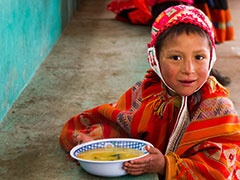The latest issue of IFPRI Insights sheds light on how IFPRI researchers are tackling the big questions related to food policy, from farm to table to the global marketplace. Composed of articles, interviews, and infographics, the November 2013 issue touches on nutrition, migration, US farm policy, economic data, water policy, and weather insurance, among other things.
According to Editor, Heidi Fritschel, “Insights gives a broader picture of the work of IFPRI’s researchers and shows how this work matters for the world’s poor and hungry people.”
The feature article, “What’s Politics Got to Do with It?” explains how some people are securing a spot for nutrition on the policy agenda, even in places where malnutrition is severe. Drawing from experiences in India, Peru, and Thailand, the article follows the winding road to progress and illustrates how the voices of a dedicated few can improve the lives of many.
An interview with IFPRI Senior Research Fellow Ephraim Nkonya brings attention to the economic costs associated with land degradation. Nkonya and his fellow researchers found that an ounce of prevention is worth a pound of cure; it is more costly to repair severely degraded land in the future than it is to protect productive land in the present.
“Saving for a Sunny Day” details how index-based weather insurance in Ethiopia is helping smallholders hedge their bets in the face of a changing climate. And an article and infographic illustrate the effects of migration from Africa south of the Sahara on the places migrants leave behind.
Read full issue of Insights magazine
Table of Contents
In Brief
* Legal Aid
* Pooling the Risk
* Mapping the Big Picture
* Farm Bill Follies
* Détente in the Dairy Sector?
* On Tap
* Talking with Morten Jerven
In Focus
* Coming and Going
* Saving for a Sunny Day
* A Bigger Toolbox
In Person
* Putting a Price Tag on Land Degradation
Feature
* What’s Politics Got to Do with It?
In Numbers
* The Ins and Outs of Migration in Africa South of the Sahara







